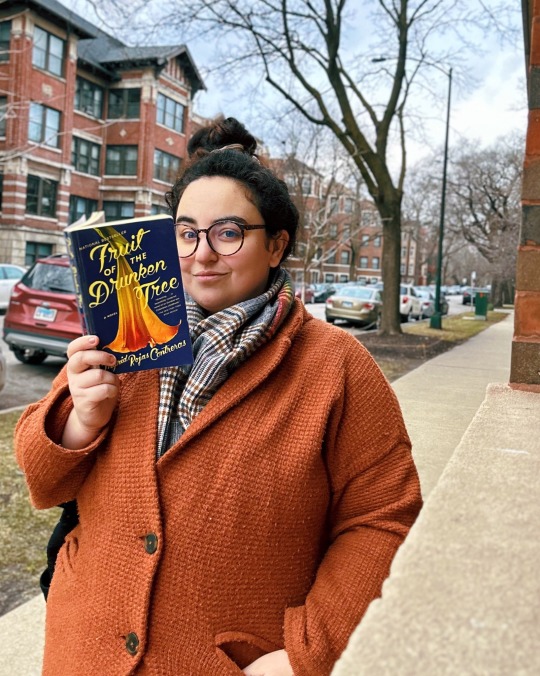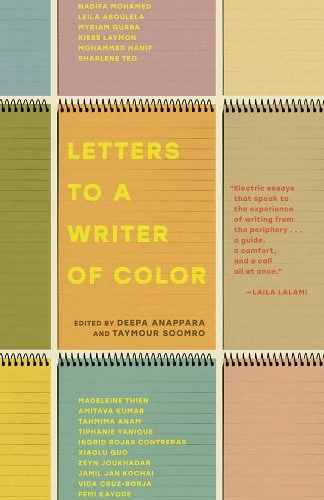#Ingrid Rojas Contreras
Text

Fruit of the Drunken Tree by Ingrid Rojas Contreras is a historical fiction about life in Colombia in the midst of the violence surround Pablo Escobar's rise in the 1990s. Young Chula lives a good home in a gated community; their new maid, Petrona, is a teen girl trying to support her entire family, who all live in the guerrilla-infiltrated slums. The violence is coming in a wave for them both, and everyone will have to figure out how to survive the best they can.
This novel (which is inspired by the author's own experiences) is richly realistic, painful, and does a really good job of highlighting how class can have huge impact on what survival looks like. What Chula and her family go through truly is traumatic in so many ways, in their exposure to violence and pain, but what Petrona goes through is horrific, and she never had the options they did, from their access to food to their ability to reach out to relatives for help, making her quest to survive so much harsher than theirs is.
Something about the writing always felt as though it could be pushed a little deeper, or richer, but it's a very accessible historical fiction read that really gets into the difficulty of survival and how we can never truly know, or access, the truths behind other people's eyes, however hard we try. The relationships between Chula and Petrona, and between Petrona and Chula's mother, really highlight this difficulty of truly accessing empathy and understanding another person's choices or lack of them.
Major content warning for sexual assault. Content warnings for domestic violence, violence, PTSD, classism.
#fruit of the drunken tree#ingrid rojas contreras#bookworm#bookstagram#book review#historical fiction#my book reviews
10 notes
·
View notes
Quote
I learned that forgetting was a path to subsistence. We are engineered this way, made to abandon what is too heavy to hold. But the body is a document. It keeps a memory of its own. We are made of loops and loops of time.
Ingrid Rojas Contreras, The Man Who Could Move Clouds: A Memoir (Doubleday, July 12, 2022)
165 notes
·
View notes
Text



AUTHOR FEATURE:
﹒Ingrid Rojas Contreras﹒
Two Books Written By this Author:
Fruit of the Drunken Tree
The Man Who Could Move Clouds
___
Happy reading!
#ingrid rojas Contreras#books#bookish#booklr#author feature#author features#tbr#to-read#latine author#latinx author#diversify your shelves#book list#Features#book blog#book blogger#bipoc authors
4 notes
·
View notes
Photo

Join us for the next Rincón Literario Bilingual Book Club meeting on Saturday, June 17, 10:30 to 11:45 a.m.!
We'll be discussing "The Man Who Could Move Clouds / El hombre que movía las nubes” by Ingrid Rojas Contreras on Zoom and upstairs in the Library Board Room!
Email [email protected] for more info!
#book club#the man who could move clouds#ingrid rojas contreras#discussion#bilingue#club de libro#library#biblioteca
2 notes
·
View notes
Quote
She tried to teach me then: there is no such thing as a curse. Her life had been touched by tragedy and loss, but she didn't need to call it anything except what it was. A life.
Ingrid Rojas Contreras, The Man Who Could Move Clouds
3 notes
·
View notes
Text
🇨🇴 Columbia
Region: South America
Fruit of the Drunken Tree
Author: Ingrid Rojas Contreras

304 pages, published 2014
Original language: English
Native author? Yes
Age: Teen-Adult
Blurb:
Seven-year-old Chula and her older sister, Cassandra, enjoy carefree lives thanks to their gated community in Bogotá, but the threat of kidnappings, car bombs, and assassinations hover just outside the neighborhood walls, where the godlike drug lord Pablo Escobar continues to elude authorities and capture the attention of the nation.
When their mother hires Petrona, a live-in-maid from the city's guerrilla-occupied slum, Chula makes it her mission to understand Petrona's mysterious ways. But Petrona's unusual behavior belies more than shyness. She is a young woman crumbling under the burden of providing for her family as the rip tide of first love pulls her in the opposite direction. As both girls' families scramble to maintain stability amid the rapidly escalating conflict, Petrona and Chula find themselves entangled in a web of secrecy that will force them both to choose between sacrifice and betrayal.
Inspired by the author's own life, and told through the alternating perspectives of the willful Chula and the achingly hopeful Petrona, Fruit of the Drunken Tree contrasts two very different but inextricably linked coming-of-age stories. In lush prose, Rojas Contreras has written a powerful testament to the impossible choices women are often forced to make in the face of violence and the unexpected connections that can blossom out of desperation.
Other reps:
Genres: #slice of life #coming of age #friendship #historical 20th century
My thoughts:
Coming-of-age story with bonding between a child narrator and her maid in 1990s (I think) Columbia. Might have some content warnings.
Review to come.
Link to buy
#columbia#ya world challenge#world books#booklr#slice of life#coming of age#friendship#historical 20th century#south america#latinx#latinx author#fruit of the drunken tree#Ingrid Rojas Contreras
2 notes
·
View notes
Text
Ep. 22-Scott Kikkawa, Ingrid Rojas Contreras
Scott Kikkawa is the author of three noir detective novels set in postwar Honolulu. Ingrid Rojas Contreras' memoir, The Man Who Could Move Clouds, was a Pulitzer Prize, National Book Award, and National Book Critics Circle Award Finalist.
Noir Hawaii and Bogotà Memoir
SCOTT KIKKAWA
Author of Red Dirt, Kona Winds and Char Siu, Scott Kikkawa is the author of three noir detective novels set in postwar Honolulu. He has been honored with an Elliot Cades Award for Literature and a crime fiction short story of his was selected as one of the “Other Distinguished Stories of 2021” in the 2022 Best American Mysteries And Suspense…

View On WordPress
#crime fiction#detective story#Francis Sheik Yoshikawa#Ingrid Rojas Contreras#Memoir#noir#postwar Honolulu#Scott Kikkawa
0 notes
Text
Being in love, entering the space of war - which is the space of death - these are all hauntings. The moment we enter those spaces, reality is up for grabs.
- 'The Man Who Could Move Clouds: A Memoir' by Ingrid Rojas Contreras
#Ingrid Rojas Contreras#The Man Who Could Move Clouds: A Memoir#The Man Who Could Move Clouds#Book quotes#Quotes#Love#War
1 note
·
View note
Text
spotify cobrándonos x los audiolibros cuando las bibliotecas locales ya nos ofrecen access to hella audiobooks on ur phone for free. las bibliotecas son de izquierdas !
#bell hooks#robin wall kimmerer#ingrid rojas contreras#gathering moss#la fruta del borrachero#gabriel garcia marquez
0 notes
Text
Mira 'El viaje de Chihiro' una y otra vez - The Atlantic
Mira ‘El viaje de Chihiro’ una y otra vez – The Atlantic
Hecho desaparecer salió en 2001 cuando tenía 8 años. Después de verla en un cine japonés, me tambaleé contra la pared en el calor del verano, sacudido por lo que acababa de ver: la grotesca transformación de padres en cerdos, monstruos sin rostro que vomitaban, la evolución de una niña sonriente en una valiente heroína. Cómo un dragón podía ser un mago y también un río, cómo la asociación y la…
View On WordPress
#Arpegio sin resolver de Joe Hisaishi#asiento tapizado#cine japonés#conversación informal#descuido reciente#El acento de Anna Paquin#el mundo del director Hayao Miyazaki#el tren sin fin#el último episodio del podcast#escritora Ingrid Rojas Contreras#espectáculos animados#espiritu oscuro#estantes de la tienda de videos#éxito de taquilla en la zona rural de Illinois#fría oscuridad#función dual#Hayao Miyazaki#Hecho desaparecer#La ubicuidad del alquiler de videos El Viaje de Chihiro#la única forma#Las películas de Miyazaki#legendario animado Isao TakahataSin#mundo espiritual#No cara#nueva era rewatch Studio Ghibli#nuevas posibilidades narrativas Veinte años#nuevo brillo#nuevo nombre Sen#objetos de la maravilla cotidiana#owen dennis
3 notes
·
View notes
Text
Healing was...about opening a path through ruins.
Purity never came into healing, because purity didn’t exist. A person would always be visited by pain and grief. A person was an accretion, constantly growing in strangeness, becoming an accumulation. Healing was found in stretching toward abundance. It was not about leaving the past behind, dividing the self into good and bad, but about opening a path through ruins.
— Ingrid Rojas Contreras, The Man Who Could Move Clouds: A Memoir (Doubleday, July 12, 2022)
69 notes
·
View notes
Text
.
#have been reading Colombian books lately and I gotta say#the bitch by Pilar Quintana followed by the fruit of the drunken tree by Ingrid Rojas Contreras followed by the Dark Bride by Laura Restrepo#is like you are all so good but so different I couldn’t have picked three more different styles if I had tried and I swear I wasn’t trying#the dark bride so far the most enjoyable I’m like halfway theu BUT#the bitch is the one that should be more widely read and I’ll definitely have to reread it#the state of the union
3 notes
·
View notes
Text
i do hate how american latino literature always needs to include a musing on indigenous beliefs of latin america like thinking of colombian american writing idk im no authority but if your characters are not indigenous then it feels disingenous, at best some kind of halfhearted acknowledgement of colonization (which could be MUCH better done in other ways imo). like ingrid rojas contreras is good at this bc she writes mixed characters who experience racism and have connections to indigenous beliefs, practices, etc. while her narratives acknowledge the erasing effects of colonization on the individual identity level and the exploitative systems at the macro level. ms patricia engel i am unsatisfied by these continued musings about what the muisca beliefs about the origins of the world were like i can only assume it's a market/publisher pressure to exoticize for an american audience? esp bc the indigenous groups chosen are either genocided groups that are literally gone or are portrayed as gone even if they're not. like rojas contreras to my recollection doesnt name specific ethnic groups (a possible sin but also she's from and writes about santander which like does not have a huge indigenous presence today compared to other parts of colombia so it's more plausible that you wouldn't name a specific cleansed group) vs. engel who returns again and again to muisca mythology when like the only function of these references are to muse on the divisions between countries (in which case you would think it would be relevant to mention that muisca people are still around and that muisca people specifically are national emblems bc of lake guatavita and that colonialism has specifically exploited their memory and iconography to create national colombian identity while their actual descendants are forgotten). idk it's not the biggest of sins like i have no reason to think any of it is wrong and it does serve its small points in the narrative and i think it would be worse to omit any mention of indigeneity in your narrative about colombia and also these parsing outs dont necessarily exist the same way in colombia. i just wonder what the like market pressures are that make these writers do this.
#mio.txt#rip to a book that goodreads reviewers are stupid about for other reasons tho#im enjoying it! and maybe this will change as it goes on like regarding native stuff#there's so much to say about colombian ideas of indigeneity like#its not patricia engel's fault per se#nor is ingrid rojas contreras like a perfect writer or anything#i think with the state of colombian american writing rn and american latino writers tbh it's impossible to approximate a like#fair and accurate and kind portrayal of race relations in latin america that usa audiences will read and consume#i just think about it
0 notes
Text

Letters to a Writer of Color
Taymour Soomro (Editor) Deepa Anappara (Editor)
A vital collection of essays on the power of literature and the craft of writing from an international array of writers of color, sharing the experiences, cultural traditions, and convictions that have shaped them and their work "Electric essays that speak to the experience of writing from the periphery . . . a guide, a comfort, and a call all at once."--Laila Lalami, author of Conditional Citizens Filled with empathy and wisdom, instruction and inspiration, this book encourages us to reevaluate the codes and conventions that have shaped our assumptions about how fiction should be written, and also challenges us to apply its lessons to both what we read and how we read. Featuring: - Taymour Soomro on resisting rigid stories about who you are
- Madeleine Thien on how writing builds the room in which it can exist
- Amitava Kumar on why authenticity isn't a license we carry in our wallets
- Tahmima Anam on giving herself permission to be funny
- Ingrid Rojas Contreras on the bodily challenge of writing about trauma
- Zeyn Joukhadar on queering English and the power of refusing to translate ourselves
- Myriam Gurba on the empowering circle of Latina writers she works within
- Kiese Laymon on hearing that no one wants to read the story that you want to write
- Mohammed Hanif on the censorship he experienced at the hands of political authorities
- Deepa Anappara on writing even through conditions that impede the creation of art
- Plus essays from Tiphanie Yanique, Xiaolu Guo, Jamil Jan Kochai, Vida Cruz-Borja, Femi Kayode, Nadifa Mohamed in conversation with Leila Aboulela, and Sharlene Teo The start of a more inclusive conversation about storytelling, Letters to a Writer of Color will be a touchstone for aspiring and working writers and for curious readers everywhere.
(Affiliate link above)
212 notes
·
View notes